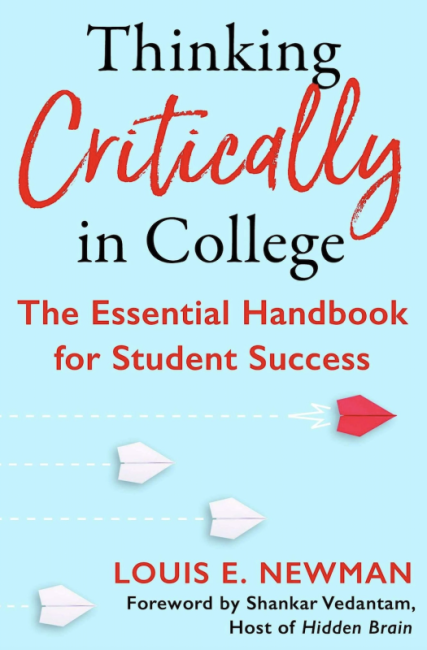You have /5 articles left.
Sign up for a free account or log in.

Louis E. Newman’s new book is ‘Thinking Critically in College: The Essential Handbook for Student Success.’
Radius Book Group
Fully supporting students means explicitly teaching them critical thinking, Louis E. Newman argues in Thinking Critically in College: The Essential Handbook for Student Success (Radius Book Group). Newman, whose book will be published March 7, is former dean of academic advising at Stanford University and John M. and Elizabeth W. Musser Professor of Religious Studies, Emeritus, at Carleton College.
Some students will absorb critical thinking skills by virtue of studying other topics, Newman tells Inside Higher Ed in an interview—but they’ll struggle unnecessarily if they don’t learn basic critical thinking concepts up front. And they won’t necessarily be “self-aware about how they are demonstrating those critical thinking skills,” making it less likely that they’ll be able to “transfer those skills to other contexts, like the workplace, after they graduate.”
How and when institutions teach critical thinking directly will vary from to campus to campus, Newman says. But they should do so early, and the process should be iterative, with faculty playing a big role. “If we introduced a set of basic critical thinking skills to students early in their first year, faculty would be able to refer back to them in subsequent courses. They would have a common vocabulary and a set of questions they would return to over and over.”
Newman says learning critical thinking involves teaching students to ask questions such as:
- What is the evidence for this claim?
- Is that evidence coming from a reliable, unbiased source?
- Are there alternative explanations for this phenomenon?
- What question(s) was the author of this article attempting to answer and why did those questions seem urgent?
Here’s the rest of Newman’s interview with Inside Higher Ed, edited for length and clarity:
Q: You argue that critical thinking can’t just be learned by osmosis. What do you mean by that?
A: The problem, in my view, is that we the faculty tend to assume that we just need to teach our courses, grade the students’ work, and the students will automatically become critical thinkers as they fulfill all the requirements for their degrees. But that’s far from guaranteed.
Even if students gain those skills incrementally over time, they will probably struggle a lot more than they needed to in the process. We could facilitate their learning of these things if we identified key critical thinking skills up front, highlighted them and helped them see how they could improve.
Virtually all institutions—certainly all liberal arts schools—have language in their mission statements about turning out critical thinkers and lifelong learners. Yet there are few courses dedicated to doing this explicitly.
Q: How do you rate colleges and universities on how they’re teaching critical thinking currently?
A: This question can really only be answered for each institution individually. But it is striking that virtually all institutions—certainly all liberal arts schools—have language in their mission statements about turning out critical thinkers and lifelong learners. Yet there are few courses dedicated to doing this explicitly.
Again, some students will internalize that way of thinking over time. But why not teach them explicitly and let them know that these are the sorts of questions they should have in mind for every assignment we give them?
Q: How should critical thinking be taught? Who within institutions should be teaching it, and how?
A: How this is done will depend on a number of institution-specific factors, including whether there are specific, required first-year courses, who teaches them, et cetera. What I know from my own teaching, though, is that I missed many opportunities to reinforce these skills. I could have flagged the sorts of critical thinking skills needed to successfully complete each assignment I gave my students.
When responding to students’ questions in class, I could have said not only “That’s a great question,” which I’m sure I did innumerable times, but added, “because you placed this observation in the context of something we covered two weeks ago” or “because you are questioning whether the evidence that the author provides really supports their position.”
When we do these things, we are identifying the habits of mind that we have developed as scholars and reinforcing them in our students. All faculty, whether they are tasked with teaching Critical Thinking 101 or not, have the opportunity to explicitly reference these critical thinking skills in their teaching. Indeed, I think it’s our obligation to do so.
Q: How does critical thinking relate to student success?
A: Of course, student success means many different things: achieving learning outcomes, persistence to graduation, career success postgraduation and so on. But one of the most important skills we want our students to learn in college is how to think rigorously and carefully. And we want them to do it not just by imitating us, but self-consciously and deliberately, so that they can monitor themselves when they fall short—for example, by succumbing to confirmation bias and so ignoring evidence that challenges their pre-existing views.
We also want students to recognize that these thinking skills are the most significant and enduring value of a college education. The information they learn may well be outdated in a matter of a few years. But the ability to think clearly will be useful in every job and throughout their daily lives, when they have to make decisions about their medical care, investments, what candidates to support for public office and how to run their businesses.
Submit your best tip for promoting academic student success here.





